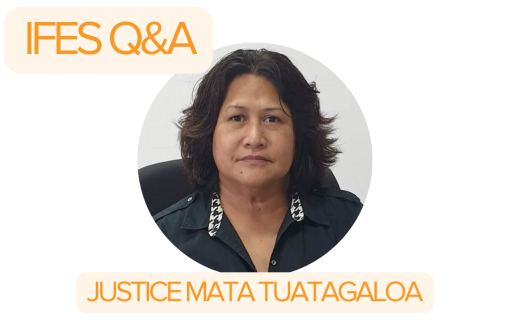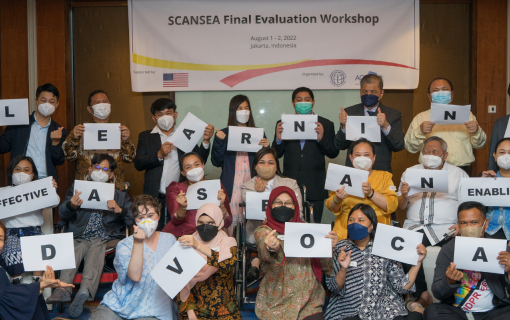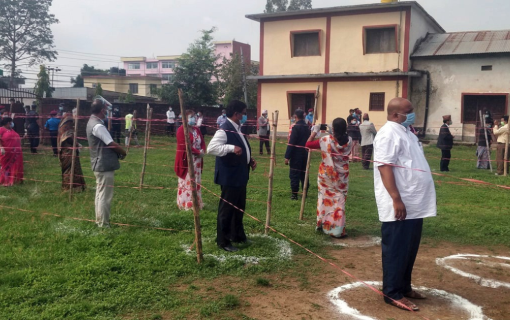Motos and Civic Education in Cambodia
Chiefs of Party are elections experts who sometimes agree to work on projects in countries they have never visited, as was the case for Robert Patterson, IFES Chief of Party in Cambodia. He arrived in Phnom Penh knowing he would live there for two years, running IFES’ women's leadership program and civic education programs. He chatted with Laura Osio, IFES Press Officer, via Skype about his experience so far.
LO: How long have you been in Cambodia?
RP: I arrived here in April of 2010.
LO: Had you ever been there before?
RP: No, this is my first time in Cambodia - actually, my first time in Asia!
LO: How long have you been working in elections?
RP: I was appointed Deputy Chief Electoral Officer in British Columbia in 1978 and have worked in elections ever since.
LO: So, clearly, even though you were in a new part of the world, you found some familiarity in the work.
RP: Yes, there are the basics of electoral processes or fundamental requirements, but each country requires its own approach, you cannot attempt to import one country's system on another.
LO: What’s it like to begin working in a country you don’t know?
RP: One has to quickly learn about the customs of the country so that you do not unintentionally offend someone. What struck me immediately about Cambodia was the overall young age of the population. Over 60% is under age 25. And it seems most of them, in Phnom Penh anyway, have what they call "motos,” small motorbikes with 100cc to 125cc engines. They are everywhere and seem to surround you like a swarm of bees. About the 3rd week I was here I was knocked to the ground by one of them—it was going the wrong way on a one-way street. I was crossing at a corner and it blind-sided me.
LO: That must have been painful!
RP: It knocked the wind out of me and gave me some scrapes but SOS [emergency services] fixed me up.
LO: What does having such a young population mean for the country's democracy?
RP: The young people know very little about the concept of democracy and voting in elections. Therefore, it is a huge challenge to motivate them to take an interest in political affairs and to participate in the electoral process.
LO: Does IFES’ program work on that?
RP: Currently the International Republican Institute is the partner that has been concentrating on youth programs. However, we are looking to engage in voter education work in relation to voter registration and we will be developing special programs targeting youth, women and people with disabilities, also those in the rural areas as 80% of the population is considered rural.
LO: What is IFES doing in Cambodia?
We have developed a very successful training program for women covering the basic elements of democracy and election administration as well as providing soft skills for leadership and personal development. We hope this will lead to an increased percentage of women working in elections. We just concluded our first series, training 165 women from five provinces and we are now planning for a second series this Fall. We are also assisting a working group of NGOs and political parties to develop a draft law on political finance which would then be introduced to the National Assembly for debate.
LO: I understand we are about to launch a new program. Can you tell us about that?
Yes, this program will lead up to the 2012 commune elections. IFES will concentrate on activities which will educate, promote and encourage greater participation in the electoral process by youth, women and people with disabilities.
LO: Have you been enjoying your time in Cambodia?
RP: The Cambodian people are a very friendly and sharing people. They will always return your smile with a smile. The food is very interesting - there are many things here that I've never seen before except in National Geographic! When you travel outside Phnom Penh (“going country side”) you have to be prepared for ants, spiders, snakes and crocodiles - on your plate, combined with very hot red chili peppers. What never ceases to amaze me though is the traffic; and is a constant topic of conversation among expats -- if there are traffic laws, no one pays any attention to them! One way streets are not! Cars will stop anywhere in the road so the driver can speak with someone.
LO: Is that a reflection of the population? Are the people very easy going, flexible, ready for some social interaction at any moment?
RP: I guess that is one way to look at it -- they just don't seem to worry about how their actions affect others; and no one seems to mind. You don't see "road rage" here. Everyone takes it in their stride.
LO: No road rage must be nice. I was walking to work here in DC a few days ago and literally witnessed two cars having a honking contest. The pedestrians are the ones who lost that one! Thank you for chatting with me, Bob, and good luck on the projects!
RP: Thank you!








